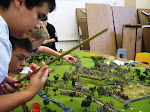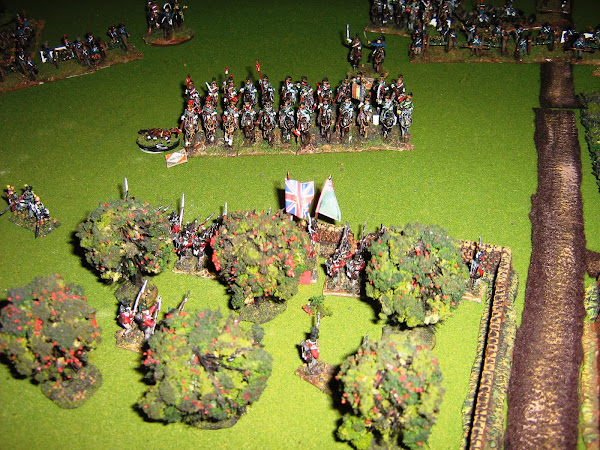The Bridges at Torres
Antigua
This
fictional battle was set up for Sharpe’s Practice. Four French players squared off against four
British. The scenario called for the
British force to hold and/or destroy the vital bridges at Torres Antigua. Captain Sharpe, two companies of highlanders
and a cannon were already in the town to contest the advance of two full French
battalions, a squadron of cavalry and two cannon.
 |
| A company of highlanders at the east bridge |
 |
| A second company of highlanders in reserve in the town |
British reinforcements were on their way,
including a second section of the Royal Foot artillery, a squadron of light
dragoons, and, most importantly, a wagon load of gun powder for the demolition
of one of the bridges.
 |
| Some of the British reinforcements |
 |
| The French attacking from the north |
 |
| Looking north. |
 |
| Looking south |
It took a
couple of turns for the French to deploy for the attack from two sides. The companies of the legere battalion
attacked from the north while the 63rd Ligne attacked from the
east. The cavalry assisted the legere
companies.
 |
| The French traffic jam |
 |
| The artillery duel |
In the
first real exchange of musketry Sergeant Harper was critically wounded and lost
for the duration of the game. This meant
that Captain Sharpe would be stretched thin in trying to lend his three
leadership points to his two sections of riflemen.
The British
reinforcements were coming from the south.
In a bold move, the British players decided to send their cavalry across
a ford and attack the French from the other side of the river. This caused a degree of concern for the
commander of the 63rd Ligne.
He attempted to bring two companies under the command of one of his big
men so that they could fire as a line.
He also deployed his cannon to take on the threat of the British horse.
To the
north, a traffic jam prevented the French from making much progress. The British gun fired on the crowded columns,
but didn’t have much affect. Then the
French gun came into play, taking a position on a hill opposite their British
counterparts. The French fire was much
more effective and killed half of the royal gunners.
Time was
winding down and so both sides feverishly attempted to push troops into the
fray. One troop of French dragoons got
stuck on the northern bridge and was forced to withdraw with staggering
casualties. The second troop attempted
to charge across the structure to seize the southern edge of the bridge. Their momentum carried them into the reserve
company of ill prepared highlanders. The
odds were squarely against them (36 dice against 12). When the final toll was assessed, however,
the kilted infantry had won the melee by a single casualty. The stunned horsemen were forced to fall back
and regroup.
In the
meantime, to the east, luck was with the French. Their card was drawn first and they were able
to unleash a thunderous volley into the column of light dragoons at close
range. Seven of the ten dashing
cavalrymen fell from their saddles.
Their bold attempt had failed, but it was not in vain.
 |
| The light dragoons take a beating |
As the
French had to take on the light dragoons, the cart with the gun powder plodded
along the road and made its way onto the bridge. As the game came to an end, the table shook
from the blast of the explosive barrels.
 |
| The French secure the northern bridge, but in the background the wagon with the gun powder can be seen just before the explosion. |
The game
was declared a draw. The French had
secured both ends of the northern bridge while the eastern bridge was
destroyed. Both sides’ cavalry had paid
the steepest part of the butcher’s bill with little to show for it.
It took
awhile for things to get going in our game, but once they did it got pretty
exciting. It was the first time playing
the game for most of the players, but they picked it up quickly and things
moved along at a good pace.

